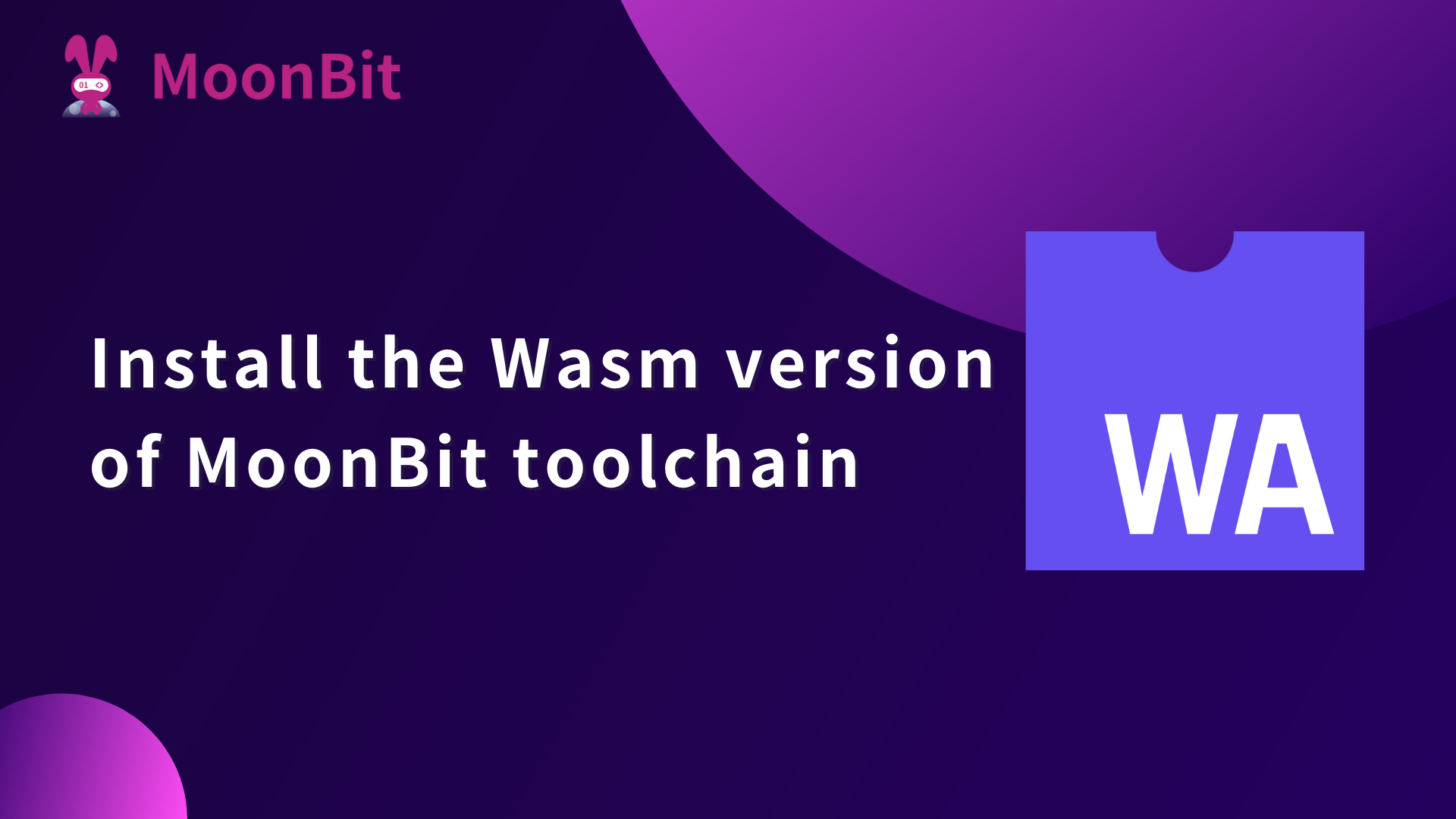Install the Wasm version of the MoonBit toolchain

As a modern programming language, MoonBit's native toolchain provides good and stable support for mainstream platforms (such as x86 Windows, x86 Linux, Arm Darwin). However, for certain specific user groups, such as older x86 Darwin (Intel Mac) users (native toolchain no longer supported) or developers eager to try it on Arm Linux (native toolchain not yet released), directly installing the native toolchain can be challenging.
Fortunately, thanks to the wasm_of_ocaml project officially released in early 2025, MoonBit's compiler toolchain can now be compiled into WebAssembly (Wasm) files and launched via a Node.js script. This means that we can use this Wasm-ized toolchain on any platform that supports Node.js.
This article will guide you step-by-step on how to install and configure the Wasm version of the MoonBit toolchain on the aforementioned platforms (or any Node.js-supported environment). Let's begin this journey of exploration!
Prerequisites
Install bash (or zsh), curl, git, nodejs, and the rust toolchain. Then, follow the instructions below to execute the corresponding commands sequentially in the interactive mode of bash (or zsh).
Since the wasm files compiled by
wasm_of_ocamlrequire a runtime that supports wasm-gc to run correctly, a higher version of Node.js should be chosen during installation. It is recommended to install version 24.0.0 or higher.
Installation Script
After installing the dependencies mentioned above, you can directly execute the following command to automatically install the WASM version of the MoonBit toolchain via a TypeScript script.
curl -fsSL https://raw.githubusercontent.com/moonbitlang/moonbit-compiler/refs/heads/main/install.ts | nodeIf you need more fine-grained control over the installation process, we also provide a manual installation guide. Please continue reading below.
Download the compressed package
First, create a temporary directory anywhere, then execute the following command to download the latest WASM version of the MoonBit toolchain compressed package:
curl -fSL -O https://github.com/moonbitlang/moonbit-compiler/releases/latest/download/moonbit-wasm.tar.gz
tar -zxvf moonbit-wasm.tar.gzNext, you need to set the MOON_HOME environment variable. The value of this variable is the directory where MoonBit toolchain-related files are stored, defaulting to ~/.moon.
export MOON_HOME="$HOME/.moon"Install the corresponding version of moon
MoonBit's build system, moon, is written in Rust and is open source. You can clone the repository locally using git and then manually build and install it using Rust's build tools. The key is to install the correct version (because many parts of the build system and compiler are tightly coupled). In the compressed package of the wasm version of the MoonBit toolchain, there is a file moon_version that records the git commit SHA corresponding to that version of moon. You can use git reset --hard to switch to the corresponding commit.
mkdir -p $HOME/.moon
MOON_VERSION=$(cat ./moon_version)
BIN_DIR="$MOON_HOME/bin"
mkdir -p "$BIN_DIR"
git clone https://github.com/moonbitlang/moon
pushd moon
git reset --hard "$MOON_VERSION"
cargo build --releaseThe built binaries are located in the ./target/release directory, namely moon and moonrun. moon is the build system, and moonrun is the wasm runtime officially provided by MoonBit. To facilitate running tests, we install it along with moon.
cp target/release/moon "$BIN_DIR"
cp target/release/moonrun "$BIN_DIR"
popdInstall moonc/moonfmt/mooninfo/runtime dependencies
The WASM version of the MoonBit toolchain includes: the compiler (moonc), the formatter (moonfmt), and the mbti file generator (mooninfo). After being compiled into WASM, they need to be bootstrapped with a Node.js script. Before placing them in MOON_HOME/bin, a suitable shebang needs to be added to these JS scripts:
To avoid stack overflow issues with the WASM version of the MoonBit toolchain, the V8 engine's stack size limit needs to be increased using the Node.js parameter
--stack-size.
sed -i '1 i #!'"$(which env) -S node --stack-size=4096" moonc.js
sed -i '1 i #!'"$(which env) -S node --stack-size=4096" moonfmt.js
sed -i '1 i #!'"$(which env) -S node --stack-size=4096" mooninfo.jsThen, the script files (and some runtime files) need to be placed in the correct location and given executable permissions.
cp moonc.js moonfmt.js mooninfo.js moonc.assets moonfmt.assets mooninfo.assets "$BIN_DIR" -r
mv "$BIN_DIR/moonc.js" "$BIN_DIR/moonc"
mv "$BIN_DIR/moonfmt.js" "$BIN_DIR/moonfmt"
mv "$BIN_DIR/mooninfo.js" "$BIN_DIR/mooninfo"
chmod +x "$BIN_DIR/moonc"
chmod +x "$BIN_DIR/moonfmt"
chmod +x "$BIN_DIR/mooninfo"
cp lib include "$MOON_HOME" -rInstall core
After installing the compiler and build system, we also need to install the corresponding version of the standard library. Similar to the build system, the standard library and the compiler have a very strong coupling relationship, so the versions need to match precisely. In the compressed package of the wasm version of the MoonBit toolchain, there is a core.tar.gz file, which contains the source code of the corresponding version of the standard library. After decompressing it to the specified location, execute the moon bundle command to package it for use.
Due to the current mechanism of moonc's bundle implementation, the
.corefile generated by the wasm version of moonc will be slightly different from the native version, which is normal.
mkdir -p "$MOON_HOME/lib/core"cd
tar -xf core.tar.gz --directory="$MOON_HOME/lib"
pushd "$MOON_HOME/lib/core"
export PATH="$MOON_HOME/bin:$PATH"
moon bundle --target all
popdAdd $HOME/.moon/bin to PATH
The final step is to add the directory containing all MoonBit executables, $HOME/.moon/bin, to your system's PATH environment variable. This allows you to run commands like moonc and moon directly from anywhere.
- bash
echo "export PATH=\"$MOON_HOME/bin:"'$PATH"' >> ~/.bashrc- zsh
echo "export PATH=\"$MOON_HOME/bin:"'$PATH"' >> ~/.zshrc- fish
echo "fish_add_path $HOME/.moon/bin" >> ~/.config/fish/config.fishSummary
Now, you can try running moon version --all to verify your installation. Enjoy the modern programming experience brought by MoonBit!
If you encounter unexpected issues during installation, you can provide feedback in the issues section of the moonbit-docs repository.